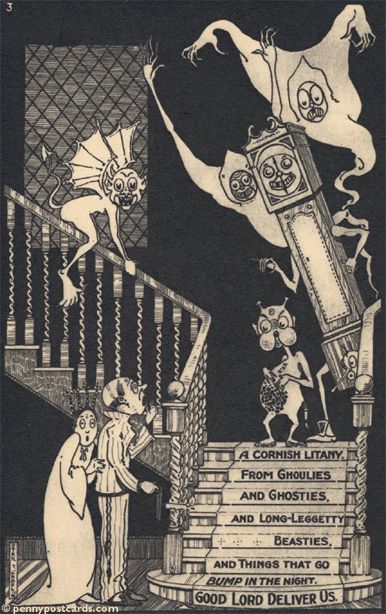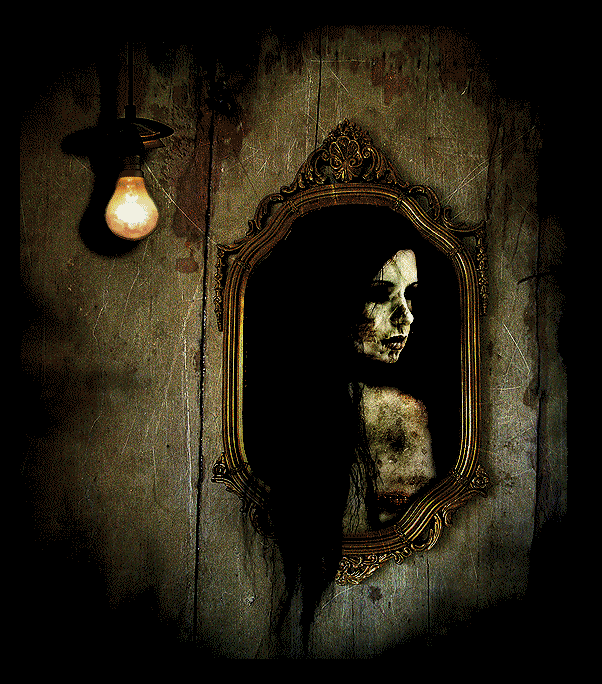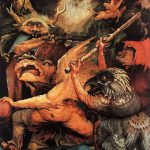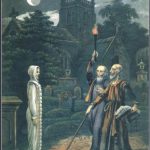
The English word ghost continues Old English ‘gást’, from a hypothetical Common Germanic ‘*gaistoz’. It is common to West Germanic, but lacking in North and East Germanic (the equivalent word in Gothic is ‘ahma’, Old Norse has ‘andi’ m., ‘önd’f.). The pre-Germanic form would have been ‘*ghoisdo-s‘, apparently from a root denoting ”fury, anger” reflected in Old Norse ‘geisa’, to rage”.
The Germanic word is recorded as masculine only, but likely continues a neuter s-stem. The original meaning of the Germanic word would thus have been an animating principle of the mind, in particular capable of excitation and fury (compare ”óðr”). In Germanic paganism, “Germanic Mercury”, and the later Odin, was at the same time the conductor of the dead and the “lord of fury” leading the Wild Hunt.
Besides denoting the human spirit or soul, both of the living and the deceased, the Old English word is used as a synonym of Latin spiritus also in the meaning of ”breath, blast” from the earliest (9th century) attestations. It could also denote any good or evil spirit, i.e. angels and demons; the Anglo-Saxon gospel refers to the demonic possession of Matthew 12:43 as se unclæna gast. Also from the Old English period, the word could denote the spirit of God, viz. the “Holy Ghost”.
The now prevailing sense of “the soul of a deceased person, spoken of as appearing in a visible form” only emerges in Middle English (14th century). The modern noun does, however, retain a wider field of application, extending on one hand to soul, spirit”, vital principle, mind or psyche, the seat of feeling, thought and moral judgement; on the other hand used figuratively of any shadowy outline, fuzzy or unsubstantial image, in optics, photography and cinematography especially a flare, secondary image or spurious signal.
Alternate words in modern usage include spectre (from Latin spectrum), the Scottish wraith (of obscure origin), phantom (via French ultimately from Greek phantasma, compare fantasy) and apparition.
The synonym spook is a Dutch loanword, akin to Low German ”spôk” (of uncertain etymology); it entered the English language via the United States in the 19th century. ”’Haint”’ is a synonym for ghost used in regional English of the southern United States. The term ”’poltergeist”’ is a German word, literally a “noisy ghost”, for a spirit said to manifest itself by invisibly moving and influencing objects.

A revenant is a deceased person returning from the dead to haunt the living, either as a disembodied ghost or alternatively as an animated (“undead”) corpse. Also related is the concept of a fetch, the visible ghost or spirit of a person yet alive.
The term apparition, from the Latin word apparere (meaning “to show oneself”), may be formally defined as:
An experience, usually visual but sometimes in other sense-modalities, in which there appears to be present a person or animal (deceased or living) … who/which is in fact out of the sensory range of the [witness]” (Thalbourne, 2003).
In other words, it is the experience of the presence of a person or animal – living or dead – that is not actually there, which seems to occur primarily through sight, but at times can seem to occur through the other senses (sound, smell, taste, and touch).








